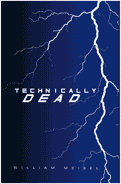
 |
A technology analyst by profession, William Meisel’s effort to convey to the world how futuristic technology could assist modern society is noteworthy. While there are shortcomings on a stylistic level, there is no doubt that the crux of the mystery—and the role of technology as a problem solver—is fascinating and important in today's tech-based culture.
Meisel's technical expertise shines through in his depiction of Erasmus, a byproduct of artificial intelligence and robotics. On the technical front, the author does a commendable job of explaining complex issues pertaining to cyberspace. Nevertheless, there is no doubt that the relationship between the main characters is the driving force behind the narrative.
The relationship between the detectives is thoroughly entertaining. The male protagonist Archie, a brilliant, but socially awkward individual whose main company is his robot, Erasmus, and Nikki, a symbolic coconut—hard on the outside, soft on the inside—are not a typical pairing; however, the duo supply many moments of either comedic relief or top notch sleuthing abilities. Archie is not the stereotypical Ph.D nerd. On the contrary, he uses his Ph.D and physique to engage in one intimate encounter after another with random women. In fact, outside of Nikki, Archie has a difficult time thinking beyond the sexual realm with women. As a result, his blunt responses and constant, seemingly innocent prying into Nikki’s dating life are endearing.
Ultimately, the story runs on two tracks: the murder mystery surrounding Edward Hoskins, founder of tech company, Involvement.com and the ever-narrowing gap between the detective duo’s professional and personal relationship. All eyes are on Hoskins's rival, Michalopoulos as the prime suspect, but as the story unfolds—and the pathology report is disclosed to the main characters—what appears as fact to the naked eye could just as easily be deception in disguise. There is a level of intelligence and deceit that each suspect is capable of that continuously places a shroud on the truth and makes Technically Dead an enjoyable whodunnit type mystery.
The plot revolves around a murder mystery incorporating futuristic technology and science fiction elements. Technology is at the forefront of human progress in the 21st century. As such, Meisel’s Technically Dead is a relevant read and glimpse into what the technology of tomorrow might look like. In fact, this novel is not unlike the popular technology crime-drama, Mr. Robot, which focuses on a somewhat awkward and mentally unstable, but brilliant hacker vigilante. In one of the more engaging scenes of the novel, readers will come face to face with the consequences of ill-intentioned hackers gaining access to vital technology.
Perhaps a product of his technically-situated mindset, Meisel falls short in the exposition vs. action balance scale. Though engaging information is being presented, it is often times being told through exposition rather than shown through action, and although the story's characters can be developed and be made more intricate, the free-flowing nature of the text makes for a relatively quick, coherent read. Rarely will readers be bogged down by complicated technology terminology. On the contrary, it is portrayed in a manner that is digestible for the layman. The majority of the dialogue comes from Archie and Nikki and is genuine and fluid. If there is one concrete aspect where the story could be more thorough, it would be fleshing out the two characters and making the side characters feel more alive and purposeful.
Meisel uses his experience in the technology industry to show the audience its intricacies and how much of an impact a rogue employee or a "win-at-all" costs competitor like Michalopoulos could have on a company. In some ways, Technically Dead is reminiscent of Dan Brown's exhilarating mystery, Digital Fortress minus elements of strong character development. Like Eric Lundquist's Red's Query: A High Tech Mystery, Technically Dead sheds light on the negative effects and sensitive nature of digital information that is vulnerable to outside influences. While it does not exhibit the strong detail-oriented writing style as a Dan Brown or Lee Child, the message within is a strong one that tech aficionados will find useful.